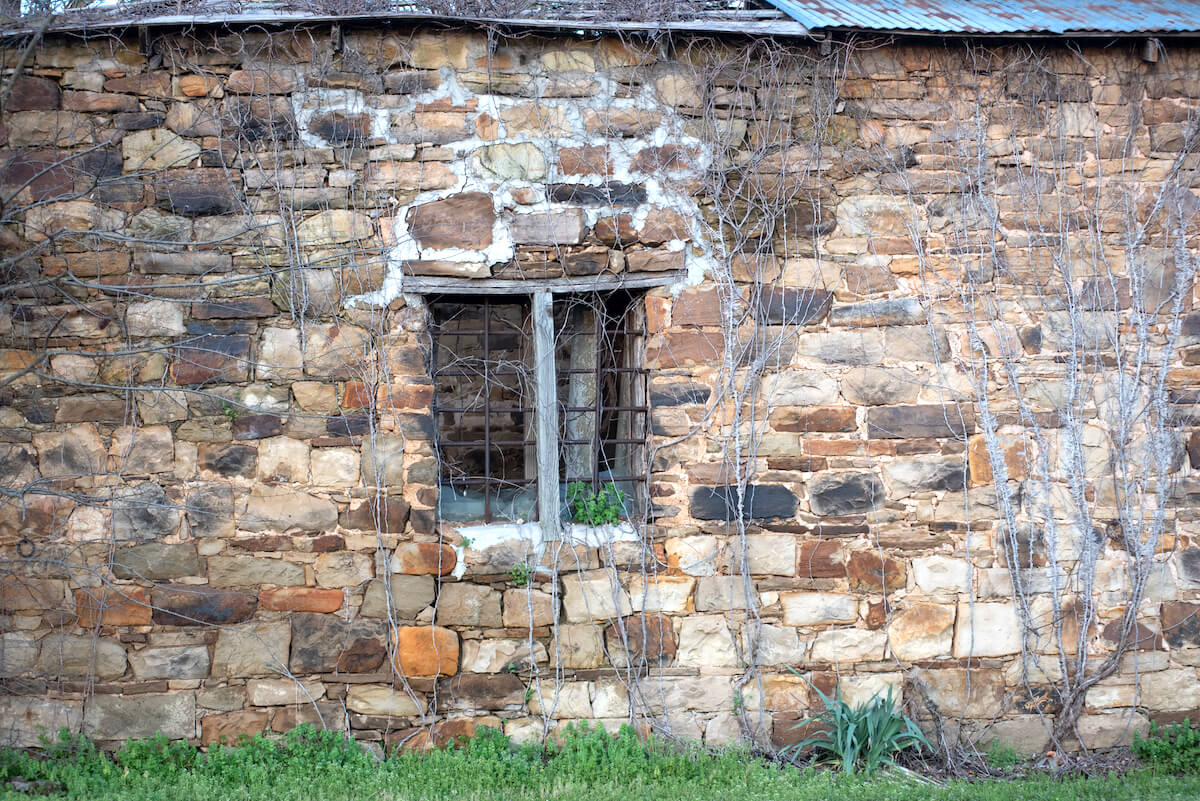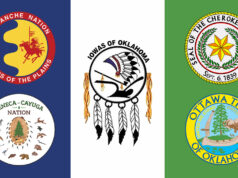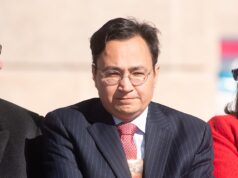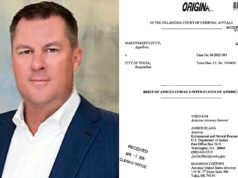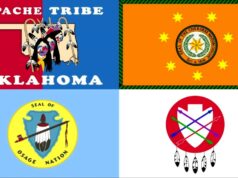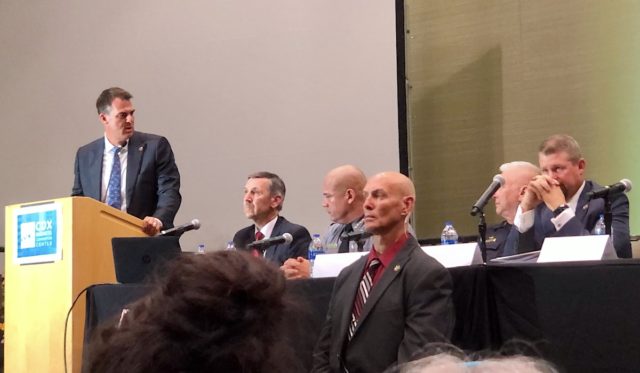

MVSKOKE NATION / TULSA — Minutes after the “McGirt v. Oklahoma community impact forum” ended early Tuesday night when a raucous crowd disrupted a panel of district attorneys that lacked tribal representation, Gov. Kevin Stitt said he wished the event would have “gone better,” but that the aim of his administration is to overturn the landmark U.S. Supreme Court ruling.
“The courts are going to have to overturn this,” Stitt told NonDoc. “For us to have a viable state going forward, we need to overturn McGirt completely.”
The 5-4 McGirt v Oklahoma ruling in July 2020 affirmed the Muscogee Nation as an Indian Country reservation as defined under 18 U.S.C. 1151a. The Oklahoma Court of Criminal Appeals followed with decisions stating that the SCOTUS ruling also applies to the Cherokee Nation, Choctaw Nation, Chickasaw Nation and Seminole Nation. This means only a tribe and the federal government — not the state — have criminal jurisdiction over major crimes that occur on reservation land involving tribal citizens.
Tuesday night’s forum — which aimed to discuss how the SCOTUS ruling has created complicated jurisdictional problems and has affected the rights of crime victims — ended early after an hour of disjointed exchanges between Stitt’s panel of eastern Oklahoma district attorneys and a rowdy crowd of Indigenous attendees. Many in the audience sat quietly and attempted to listen, but others shouted questions and rebuttals when the district attorneys tried to speak.
“This was an organized hit job from the very beginning,” Stitt said of the booing and name-calling during the forum his administration organized. “The victims didn’t get anything heard. They weren’t able to talk. They weren’t able to ask questions. They weren’t able to listen because the people are shouting.”
As Stitt was interrupted during his opening remarks by constant boos and jeers from the crowd, he said “we’re really taking away from the victims’ time,” in an attempt to silence the crowd.
“We are the victims,” an Indigenous attendee shouted back.
‘No tribal representation’
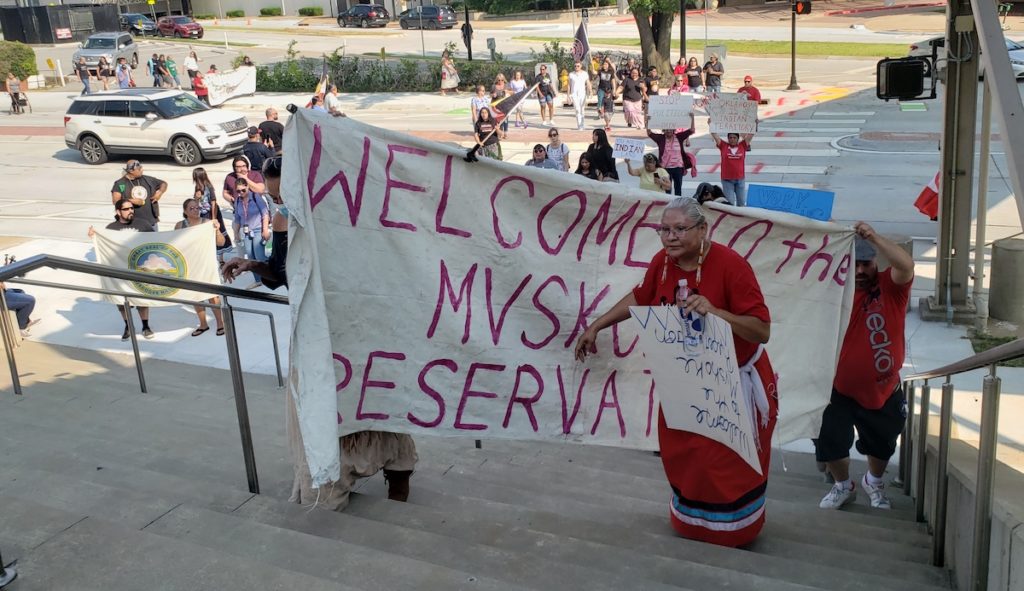
In the hours leading up to the panel, an Indigenous advocacy group stood outside of the convention center. Brenda Golden, a Muscogee Nation citizen and attorney, called the gathering a “demonstration of solidarity for the (1866) treaty and sovereignty rights,” not a protest.
Golden organized the demonstration after learning there would be no tribal representation on the panel.
“When I was at the courthouse last week and saw this flyer that didn’t have any native people on it, no tribal representation, that’s the reason I was like, ‘We’ve got to do something to show solidarity,'” Golden said.
Attendees voiced the same concerns throughout the forum.
Matt Ballard, district attorney of Rogers, Mayes and Craig counties, which lie within the Cherokee Nation reservation boundaries, said he “has spent a lot of time over the past few months working with the Cherokees on a number of issues.”
“Why are they not here?” a member of the crowd asked.
Two minutes later, a chant broke out from some attendees who shouted, “Treaties are the law of the land.” Prompted by the chant, Golden walked to the front of the forum, grabbed a microphone from the panel and requested respectful behavior from the crowd.
“We came here in unity to show solidarity for McGirt and for our reservation,” Golden said sternly. “We didn’t come here to show our asses.”
Stitt and members of his administration told NonDoc after the forum that they had invited tribal attorneys general and their chiefs to sit on the panel and participate in the forum, but that no response had been received.
Carly Atchison, Stitt’s communications director, provided an email she sent June 3 to the attorneys general of the Muscogee, Cherokee and Chickasaw nations:
Good afternoon —
I’m writing today to invite you and your Chiefs to the McGirt v. Oklahoma: Community Impact Forum, a joint event with Steve Kunzweiler’s office and Marsy’s Law.
Planning is still in its early stages, but the date is set for July 13, 2021 from 6:00-8:00pm in Tulsa. Exact location TBD.
The event will feature victims, advocacy groups, district attorneys, local law enforcement, tribal leaders, U.S. attorneys, and representatives from our congressional delegation, as well as the Governor, to come together to help answer the questions we hear from those who have been affected by the McGirt decision: “Where do I go now? Who can I talk to? Who can help me?”
The event will include a presentation from Steve Kunzweiler and a speaking panel to take questions from the audience, as well as an opportunity for victims to get connected with advocacy groups and resources.
More details and a formal invitation will follow, but out of respect for all of your busy schedules, we wanted to ensure your Chiefs have ample heads up to reserve this date/time on your calendar. Their participation will be key.
If you have any questions, please don’t hesitate to reach out to myself, Heather Prater or Sally Van Schenck from Kunzweiler’s office CC’ed here.
Many thanks!
– Carly
Prior to the forum, the Muscogee Nation distributed a press release from Principal Chief David Hill regarding his decision not to attend the event.
“One-sided political campaigns like the one being held here tonight do not promote healing or progress for anyone nor do they make our communities safer,” he said.
Despite the email from Atchison and a July 12 email from Tulsa District Attorney Steve Kunzweiler’s office, Hill claimed the Muscogee Nation would have “welcomed the opportunity to work with local officials to make this an informative and productive session. But that invitation never came.”
“I hope our citizens respect my decision to not attend,” Hill said. “But I believe firmly that government officials who wish to undermine sovereignty should not expect that we will help them do it by participating in every sensational scheme they can conjure up.”
Building a ‘dialogue’
Between Tuesday night’s shouting and bickering, there were occasional signs of connection between some of the panelists and some in the crowd.
In particular, some of the district attorneys on the panel emphasized cooperation with tribal governments despite Stitt’s stance that the historic Supreme Court decision needs to be overturned.
“Our office recognizes McGirt, and as far as we’re concerned, sovereignty is established. We’re past that. The (Muscogee) Nation exists, and we’re here to honor that,” said Carol Iski, district attorney of Okmulgee County and McIntosh County.
Okmulgee County features the capital of the Muscogee Nation, and McIntosh County shares a small patch of land with the Cherokee Nation.
“How do we go from here to make sure everybody’s safe and honor what the Supreme Court has set out? How do we solve the problems?” Iski asked the crowd. “That’s what I’m here to do. There needs to be a dialogue.”
Ryan Leonard, who serves as Stitt’s special counsel for Native American affairs, agreed with Iski.
“What we need is a dialogue. We are all trying to solve this,” Leonard said.
One piece of the building “dialogue” is a proposal of state compacting legislation that would allow the state to retain some criminal jurisdiction to lighten the caseload on many of the tribes and U.S. attorney offices. U.S. Rep. Tom Cole proposed state compacting legislation back in May. But Cole’s filed compacting legislation would only apply to the Cherokee Nation and Chickasaw Nation. It proposes other changes to federal Indian law as well and is seen as a work in progress.
Stitt, however, emphasized his belief that the McGirt ruling needs to be overturned entirely. The state already has a challenge before the Supreme Court that attempts to narrow the McGirt decision’s impact.
“Where do you go to start compacting with that group?” Stitt asked following the conclusion of the event. “We need to take a case back and have the courts tell us that we’re going back to the way we’ve operated the state for 114 years.”
Asked about the reasons that Indigenous attendees might feel disenfranchised owing to historic frustrations, Stitt spoke of his tribal citizenship, which has been a point of contention for some.
“I’m a tribal citizen,” Stitt said. “I don’t feel like that, and I’m governor.”
RELATED
Stitt is a citizen of the Cherokee Nation, but since he took office in January 2019, he has received widespread criticism from tribal leaders and other citizens across eastern Oklahoma. There is even an online petition to remove his Cherokee citizenship, that some believe was fraudulently obtained by an ancestor.
Sam Alexander, former speaker of the Muscogee National Council, sat in the front row Tuesday night and said after the forum that Stitt uses his tribal citizenship “strategically.”
“He must have a little card that says he’s got some Indian blood in him, but I doubt he knows where any of the Cherokee churches are, (or the) ceremonial ground, any of that,” Alexander said.
Alexander noted that although the forum was “not done well,” it was important for Stitt and the panelists to see how strongly tribal citizens feel about the SCOTUS ruling and their tribal sovereignty.
“They needed to see up close and personal how these natives feel,” Alexander said. “And I think they did.”









